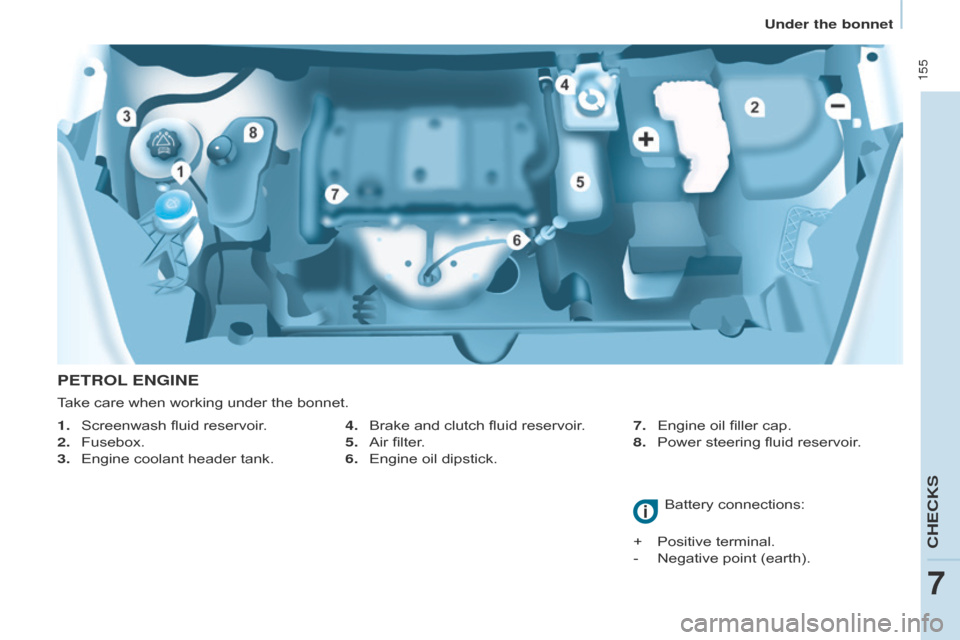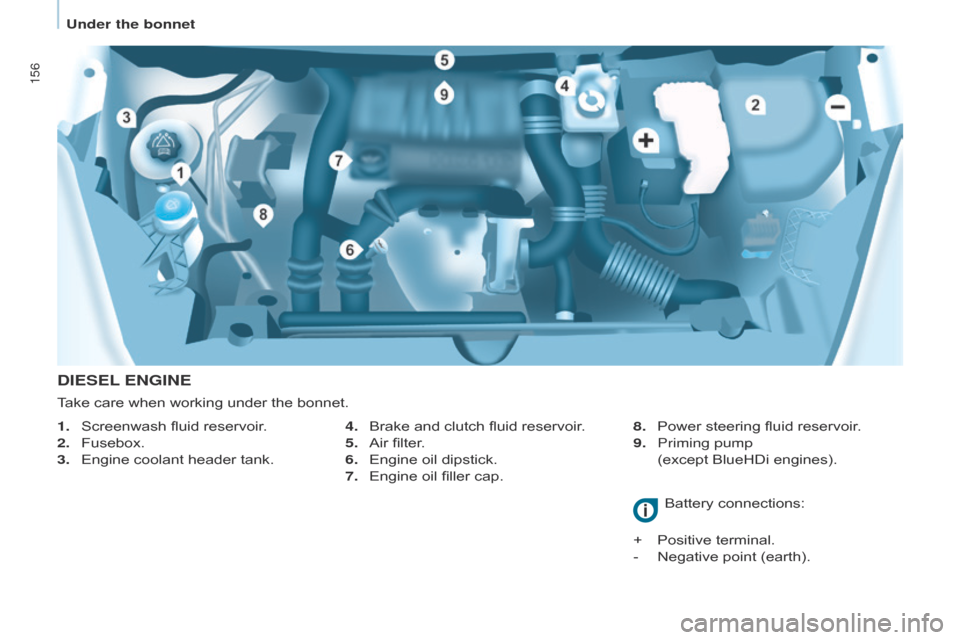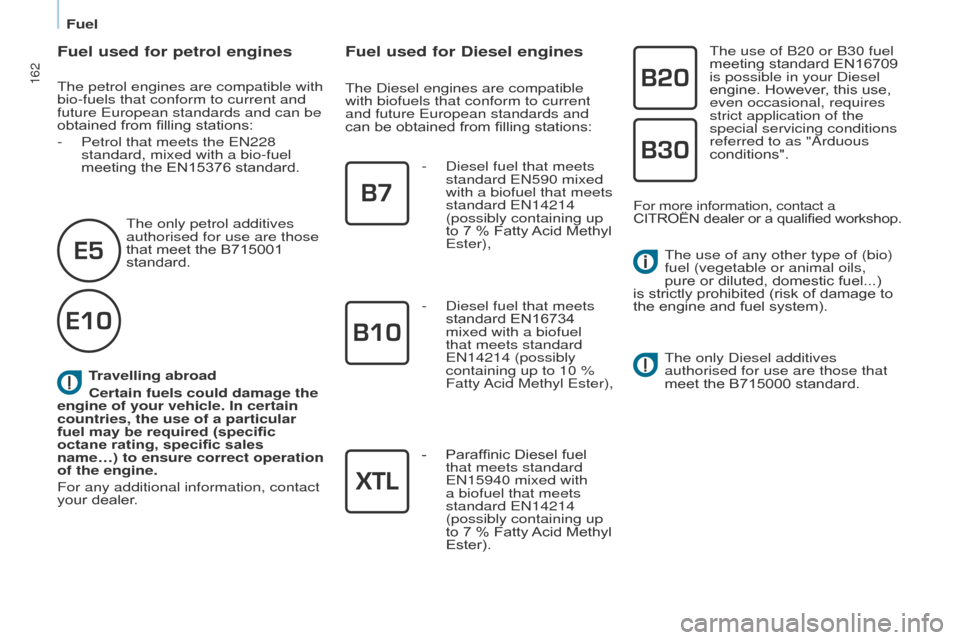engine Citroen BERLINGO MULTISPACE RHD 2017 2.G Owner's Guide
[x] Cancel search | Manufacturer: CITROEN, Model Year: 2017, Model line: BERLINGO MULTISPACE RHD, Model: Citroen BERLINGO MULTISPACE RHD 2017 2.GPages: 292, PDF Size: 10.19 MB
Page 150 of 292

148
Berlingo2VP_en_Chap06_Accessoire_ed02-2016
For more information about
weights and towed loads, refer to
chapter 9, "Weights" section.
TOWING A TRAILER , A CARA VAN ...
Distribution of loads
Distribute the load in the trailer so
that
the heaviest objects are as
close as possible to the axle and
the nose weight is close to the
maximum authorised without, however
,
exceeding
it.
Cooling
Towing a trailer on a slope increases
the
coolant temperature. As the fan is electrically controlled, its
cooling capacity is not dependent on
the
engine speed.
You should therefore use a high gear
to lower the engine speed and reduce
your
speed.
In all cases, pay attention to the
coolant
temperature.
Driving advice
A towed vehicle must free wheel: gearbox
in neutral.
Towing a trailer
Page 151 of 292

149
Berlingo2VP_en_Chap06_Accessoire_ed02-2016
Good Practice
In certain cases of particularly arduous
use (towing the maximum load up a
steep slope in high temperatures), the
engine automatically limits its power.
In this case, the air conditioning is
automatically cut of
f to save engine
power.
Tyres
Check
the tyre pressures of the towing
vehicle and of the trailer
, observing the
recommended
pressures.
Chapter
7, "Levels" section.
If the coolant temperature
warning lamp comes on, stop
the vehicle and switch off the
engine
as soon as possible.Brakes
Towing
increases the braking distance. Drive at a moderate speed, change
down
early and brake gradually.
Towbar
We recommend the use of genuine
CITROËN towbars and their wiring
harnesses, which have been tested
and approved from the design stage of
your vehicle, and that you entrust the
fitting
of this equipment to a CITROËN
dealer
.
If
this equipment is not fitted by a
CITROËN dealer
, it is imperative that
it
is fitted using the electrical pre-
equipment installed at the rear of the
vehicle and in accordance with the
manufacturer's
instructions.
In accordance with the general
instructions a reminder of which has
been given above, we draw your
attention
to the risk associated with
fitting
a towbar or electrical accessory
not
recommended by CITROËN.
Fitting such equipment could result in
the failure of your vehicle's electronic
system.
Please obtain information from
the
Manufacturer before fitting this type
of
equipment.
Side wind
Sensitivity
to
side
wind
is
increased.
Drive smoothly and at a moderate
speed.
ABS/DSC
The
ABS or DSC systems only control
the
vehicle,
not
the
trailer
or
caravan.
Parking sensors
The
rear
parking
sensors
system
does
not
function
while
the
vehicle
is
towing.
Chapter
9,
"Identification
markings"
section.
Towing a trailer
ACCESSORIES
6
Page 155 of 292

153
Berlingo2VP_en_Chap07_Verification_ed02-2016Berlingo2VP_en_Chap07_Verification_ed02-2016
TOTAL & CITROËN
Partners in performance and
protecting the environment
Innovation in the search for
performance
For over 40 year, the TOTAL Research and
Development departments have developed
for CITROËN, lubricants to match the latest
technical innovations on CITROËN vehicles,
both for competition and for everyday motoring.
For you, this is an assurance that you will
obtain of the best performance from your
engine.
Optimum protection for your
engine
By having your CITROËN
vehicle serviced with TOTAL
lubricants, you are contributing
towards improving the life and
performance of your engine,
while also protecting the
environment.
prefers
CHECKS
7
Maintenance with TOTAL
Page 157 of 292

155
Berlingo2VP_en_Chap07_Verification_ed02-2016Berlingo2VP_en_Chap07_Verification_ed02-2016
PETROL ENGINE
1. Screenwash fluid reservoir.
2.
Fusebox.
3.
Engine
coolant header tank.
Battery
connections:
+
Positive
terminal.
-
Negative
point (earth).
Take
care when working under the bonnet.
4. Brake and clutch fluid reservoir.
5.
Air
filter.
6.
Engine
oil dipstick.7.
Engine oil filler cap.
8.
Power
steering fluid reservoir.
CHECKS
7
Under the bonnet
Page 158 of 292

156
Berlingo2VP_en_Chap07_Verification_ed02-2016Berlingo2VP_en_Chap07_Verification_ed02-2016
DIESEL ENGINE
4. Brake and clutch fluid reservoir.
5.
Air
filter.
6.
Engine
oil dipstick.
7.
Engine
oil filler cap. 8.
Power steering fluid reservoir.
9.
Priming pump
(except
BlueHDi engines).
1.
Screenwash
fluid
reservoir.
2.
Fusebox.
3.
Engine
coolant
header
tank.
Battery
connections:
+
Positive
terminal.
-
Negative
point (earth).
Take
care
when
working
under
the
bonnet.
Under the bonnet
Page 159 of 292

157
Berlingo2VP_en_Chap07_Verification_ed02-2016Berlingo2VP_en_Chap07_Verification_ed02-2016
LEVELS
Oil change
This must be carried out at
the intervals specified in the
manufacturer's
servicing schedule.
Ask
for
advice from a CITROËN dealer.
Remove
the dipstick before filling.
Check
the level after filling (never
exceed
the max mark).
Refit
the oil filler cap before closing the
bonnet.
Changing the brake fluid
The brake fluid must be changed at the intervals stated, according to the
manufacturer's servicing schedule.
Use
fluids recommended by the
manufacturer
, which meet the DOT4
standard.
The level must be between the MIN
and
MAX marks on the reservoir.
If
fluid has to be added frequently,
this indicates a fault which must be
checked
by a CITROËN dealer or
a
qualified workshop as soon as
possible.
Warning lamps
If you have to remove / refit the engine style cover, handle it with
care
to avoid damaging the fixing
clips.
Oil level
It is recommended that the oil level be
checked every 3 000 miles (5 000 km)
and topped up if necessary between oil
changes.
Check
the level with the vehicle level,
engine
cold, using the dipstick.
Dipstick
Viscosity selection
In all cases, the oil selected must
meet
the requirements specified in the
manufacturer's
service schedule.
These regular maintenance
operations
will keep your vehicle
in
good working order.
Ask
for
advice from a CITROËN dealer or refer
to the maintenance and warranty guide
in
the handbook pack.
Checks using the warning
lamps in the instrument panel
is described in chapter 3,
"Instruments and controls"
section.
There
are two marks on
the
dipstick:
A = maximum
If
you fill past this mark,
contact a CITROËN
dealer
or a qualified
workshop.
B
= minimum
Never allow the level to
fall
below this mark.
To maintain the reliability
of engines and emission
control systems, the use
of additives in engine oil
is
prohibited.
CHECKS
7
Levels
Page 160 of 292

158
Berlingo2VP_en_Chap07_Verification_ed02-2016Berlingo2VP_en_Chap07_Verification_ed02-2016
Cooling system
Only use the fluid recommended by the manufacturer.
Otherwise,
you risk seriously damaging
your
engine.
When the engine is warm, the
temperature of the coolant is controlled
by
the engine fan.
As
this fan can
operate
with the ignition key removed
and because the cooling system is
pressurised, wait for at least one hour
after the engine has stopped before
carrying
out any work.
Slacken
the cap by 1/4 of a turn to
release the pressure to prevent any
risk
of scalding. When the pressure
has dropped, remove the cap and top
up
the level with coolant.
If
fluid has to be added frequently,
this indicates a fault which must be
checked
by a CITROËN dealer as
soon
as possible.
Power steering fluid level
The vehicle must be parked on level ground with the engine cold. Unscrew
the cap integrated with the gauge and
check
the level which must be between
the
MIN and MAX marks. In
order to regenerate the filter, you are advised to drive at a speed higher
than
40 mph (60 km/h) for at least five minutes as soon as possible, when
traffic
conditions permit (until the
message disappears and the service
warning
lamp goes off).
During regeneration of the particle
emission
filter, the noise of a relay
operating may be heard under the
dashboard.
If the message is still displayed and
if the service warning lamp remains
on, contact a CITROËN dealer or a
qualified
workshop.
Topping up
The level must be between the MIN
and
MAX
marks
on
the
expansion
bottle.
If
more
than
1
litre
of
fluid
is
required to top up the level, have the
system
checked
by
a
CITROËN
dealer
or
a
qualified
workshop.
Screenwash level
For best quality cleaning and for your
safety, we would advise that you use
products of the CITROËN range.
For optimum cleaning and to avoid
freezing,
this fluid must not be topped
up
or replaced with plain water.
Capacity
of the screenwash reservoir:
approximately
3 litres.
Diesel additive level
(Diesel with particle
filter)
Topping up
This additive must be topped up by
a CITROËN dealer or a qualified
workshop
without delay.
Waste products
Avoid prolonged contact of used oil
with the skin.
Brake
fluid is harmful to health and
very
corrosive.
Do
not dispose of used oil, brake fluid
or coolant into drains or into the ground
but into the containers dedicated to this
use at a CITROËN dealer (France) or
an
authorised waste disposal site.
The minimum level of this additive
is indicated by lighting of the service
warning lamp, accompanied by an
audible signal and a message in the
screen.
When this occurs with the engine
running it is due to the start of
saturation
of
the
particle
filter
(exceptionally prolonged urban type
driving
conditions:
low
speed,
long
traffic
jams,
...).
Levels
Page 162 of 292

160
Berlingo2VP_en_Chap07_Verification_ed02-2016Berlingo2VP_en_Chap07_Verification_ed02-2016
Good practice
Bleeding water from the Diesel
filter
Manual gearbox
Have the level checked in accordance with the
manufacturer's servicing schedule.
In order to avoid damaging the
electrical units, we strongly
advise you not to use high
pressure washing to clean the engine
compartment.
After washing the vehicle dampness,
or
in
winter, ice may form on the brake
discs
and pads: braking efficiency may
be
reduced. Make some light brake
applications to dry and de-ice the
brakes.
If this warning lamp comes
on,
bleed
the
filter.
Otherwise
bleed regularly each time the
engine
oil
is
changed.
HDi engines use advanced
technology.
All
work
requires
special training, so should be
entrusted
to
a
CITROËN
dealer.
Depending
on
country
of
sale.
To drain the water, unscrew the bleed
screw
located
on
the
filter.
Operate until all of the water no longer
flows
in
the
transparent
pipe,
then
tighten
the
bleed
screw.
Only use products recommended by
CITROËN or products of equivalent
quality and specification.
In order to optimise the operation
of
units as important as the braking
system, CITROËN selects and of
fers
specific products.
Checks
Page 163 of 292

161
Berlingo2VP_en_Chap07_Verification_ed02-2016Berlingo2VP_en_Chap07_Verification_ed02-2016
REFUELLING
Low fuel level
Filling
The fuel tank must be filled with the
engine off.
-
Open
the fuel filler flap.
-
Insert
the key, then turn it a quarter
turn.
-
Remove
the cap and hook it onto
the clip located on the inside of the
flap. When
filling with fuel, a
mechanical system prevents
opening
of the left-hand side door.
When
the fuel filler flap is open, ensure
that
no one tries to slide this door.
Once
the flap has been closed, the
sliding
side door may jam, push the
door
to close it then open it.
When the low fuel level is
reached, this warning lamp
comes
on. A
label affixed to the inside of the flap
reminds you of the type of fuel to be
used.
Y
ou must fill with at least 5 litres of fuel
for
it to be registered by the fuel gauge.
When
the fuel filler cap is opened,
there
may be a slight inrush of air.
This
vacuum is entirely normal and is due to
the
sealing of the fuel system.
When
filling the fuel tank, do not
continue after the 3rd cut-off of the
nozzle.
This
could
cause malfunctions.
The
capacity
of
the
fuel tank is
approximately 60 litres (or 55 litres
according
to
version).
-
After
filling
the
fuel tank, lock the
cap
and
close
the flap.
You then have approximately 8 litres
of
fuel
remaining.
Fill up without delay to avoid running
out
of
fuel.
Never
risk
driving
until
you
run
out
of
fuel as this may damage the emissions
control
and
injection
systems.
CHECKS
7
Fuel
Page 164 of 292

162
Berlingo2VP_en_Chap07_Verification_ed02-2016Berlingo2VP_en_Chap07_Verification_ed02-2016
Travelling abroad
Certain fuels could damage the
engine of your vehicle. In certain
countries, the use of a particular
fuel may be required (specific
octane rating, specific sales
name…) to ensure correct operation
of the engine.
For any additional information, contact
your
dealer.
Fuel used for petrol engines
The petrol engines are compatible with
bio-fuels that conform to current and
future European standards and can be
obtained from filling stations:
-
Petrol that meets the EN228
standard, mixed with a bio-fuel
meeting
the EN15376 standard.
The only petrol additives
authorised for use are those
that
meet the B715001
standard.
Fuel used for Diesel engines
The Diesel engines are compatible
with biofuels that conform to current
and future European standards and
can be obtained from filling stations:
-
Diesel fuel that meets
standard EN590 mixed
with a biofuel that meets
standard EN14214
(possibly containing up
to
7 % Fatty
Acid
Methyl
Ester),The use of B20 or B30 fuel
meeting
standard EN16709 is possible in your Diesel
engine.
However, this use, even occasional, requires
strict application of the
special servicing conditions
referred to as "Arduous
conditions".
-
Diesel fuel that meets
standard
EN16734
mixed with a biofuel
that meets standard
EN14214 (possibly
containing up to 10 %
Fatty
Acid Methyl Ester),
For more information, contact a
CITROËN dealer or a qualified workshop.
- Paraffinic Diesel fuel that meets standard
EN15940 mixed with
a biofuel that meets
standard EN14214
(possibly containing up
to
7 % Fatty
Acid
Methyl
Ester). The use of any other type of (bio)
fuel (vegetable or animal oils,
pure
or diluted, domestic fuel...)
is
strictly prohibited (risk of damage to
the
engine and fuel system).
The only Diesel additives
authorised for use are those that
meet the B715000 standard.
Fuel